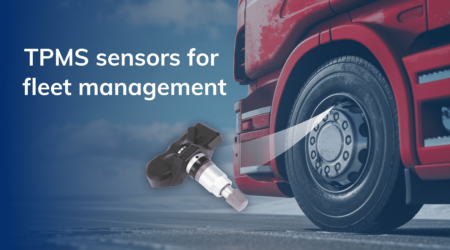Why Should Companies Invest in a Fuel Monitoring Device?


Companies are constantly seeking technologies that promise not only to streamline operations but also to increase their bottom line. One such innovation that has garnered attention across various industries is the fuel monitoring device. These devices, sophisticated in their design and functionality, offer a direct pathway to understanding and optimizing fuel consumption, a critical expense for any business reliant on transportation and machinery. This blog post aims to unfold the myriad reasons companies should consider investing in fuel monitoring technology, illuminating the economic, environmental, and operational benefits that accompany its adoption.
Understanding Fuel Monitoring Devices
What are Fuel Monitoring Devices?
Fuel monitoring devices are advanced systems designed to track, record, and manage the fuel consumption of vehicles and machinery. These devices leverage a combination of sensors, GPS technology, and data analytics to provide real-time insights into fuel usage patterns, efficiency, and potential wastage. By offering a granular view of how fuel is consumed across a company’s fleet or equipment, these devices lay the groundwork for informed decision-making.
Types and Applications
There are various types of fuel monitoring devices available in the market, ranging from simple fuel flow meters to complex telematics systems that integrate fuel data with vehicle location and operational metrics. These devices find application in diverse sectors, including logistics and transportation, construction, agriculture, and any industry where fuel costs significantly impact operations.
The Role of Technology
The evolution of fuel monitoring devices is closely tied to advancements in IoT (Internet of Things) and big data analytics. Modern devices are not just passive recorders of fuel consumption; they are intelligent systems capable of predicting trends, detecting anomalies, and even suggesting operational improvements. This technological sophistication is crucial for companies aiming to stay ahead in today’s competitive environment.
The Economic Benefits
Cost Savings Through Optimized Fuel Consumption
Investing in fuel monitoring devices offers substantial cost savings due to their ability to provide detailed insights into fuel usage. Companies can identify inefficiencies and implement more fuel-efficient practices. For instance, logistics companies have reported up to 20% savings on fuel expenses by optimizing routes, reducing idling times, and improving vehicle loading efficiency.
Reduction in Fuel Theft and Discrepancies
Fuel theft is a significant concern for businesses relying on large fleets or heavy machinery. Fuel monitoring devices serve as a deterrent to theft by offering precise tracking of fuel levels, usage, and refueling events. Any discrepancies between reported fuel purchases and actual fuel levels can quickly be identified, allowing companies to take immediate corrective action. This not only prevents theft but also ensures that billing and fuel allocation are accurate and transparent.
Improved Budgeting and Financial Planning
Accurate fuel data from monitoring devices aids companies in better forecasting their fuel needs and budgeting accordingly. With a clear understanding of fuel consumption patterns, businesses can negotiate better fuel contracts, plan for seasonal variations in fuel usage, and allocate resources more efficiently. This level of financial planning precision is invaluable for maintaining competitive advantage and ensuring long-term profitability.
Environmental Impact
Reduction in Carbon Footprint
Investing in fuel monitoring devices aligns with the global push towards sustainability and environmental responsibility. By optimizing fuel consumption, companies not only reduce their operational costs but also their carbon emissions. Efficient fuel use means fewer greenhouse gases are released into the atmosphere, contributing to a cleaner environment. For companies committed to reducing their environmental impact, fuel monitoring devices are a step in the right direction.
Compliance with Environmental Regulations
Many countries have stringent environmental regulations designed to limit emissions from vehicles and machinery. Fuel monitoring devices can help companies ensure compliance with these regulations by providing accurate data on fuel consumption and associated emissions. This not only helps in avoiding potential fines but also enhances the company’s image as a responsible corporate citizen.
Enhancing Operational Efficiency
Improved Fleet Management and Maintenance Scheduling
Fuel monitoring devices offer comprehensive data that can significantly improve fleet management and maintenance scheduling. By analyzing fuel usage patterns, companies can identify vehicles that are underperforming or require maintenance, preventing costly breakdowns and extending the lifespan of their fleet. Additionally, data from these devices can inform better vehicle purchase decisions, focusing on fuel-efficient models that match the company’s operational needs.
Data-Driven Decision Making
The real-time data provided by fuel monitoring devices empowers companies to make informed, data-driven decisions. Whether adjusting routes in response to traffic conditions to save fuel, scheduling deliveries based on fuel efficiency, or optimizing loading procedures, the insights gained from fuel data are invaluable. This level of agility and responsiveness can significantly enhance operational efficiency and customer satisfaction.
Impact on Driver Behavior and Training
Fuel monitoring devices can also influence driver behavior, encouraging more fuel-efficient driving practices. By monitoring speed, idling times, and braking patterns, companies can identify areas for improvement and tailor driver training programs accordingly. This not only reduces fuel consumption but also promotes safer driving habits.
Integration with Business Systems
Seamless Integration with Existing Systems
Modern fuel monitoring devices seamlessly integrate with existing business systems, such as ERP (Enterprise Resource Planning) and fleet management software. This integration enables the aggregation of fuel data with other operational metrics, providing a holistic view of the company’s performance. Such integration enhances the utility of fuel data, making it a cornerstone of strategic decision-making.
Enhanced Data Analytics and Reporting
The integration of fuel monitoring devices with business systems enhances the company’s data analytics and reporting capabilities. Fuel consumption data can be analyzed in conjunction with other metrics to identify trends, efficiencies, and areas for improvement. This level of analysis is crucial for continuous improvement and maintaining a competitive edge in the market.
Conclusion
Fuel monitoring devices offer significant benefits in today’s business environment. They deliver cost savings, prevent fuel theft, aid in budgeting, minimize environmental impact, and enhance operational efficiency.
The integration of fuel monitoring technology with existing business systems amplifies its value, offering detailed insights that drive data-driven decision making and strategic planning. The success stories of companies across industries serve as a testament to the transformative potential of these devices.
In today’s competitive landscape, efficiency and sustainability are crucial goals driving the strategic need for fuel monitoring devices. Investing in these technologies helps companies optimize fuel usage, cut operational costs, and fulfill environmental responsibilities effectively.
We encourage businesses of all sizes and sectors to consider the adoption of fuel monitoring devices. By adopting fuel monitoring technology, companies position themselves for economic benefit and operational excellence while aligning with global sustainability goals. Now is the time to take action and steer your company towards a more efficient, sustainable, and profitable future.



